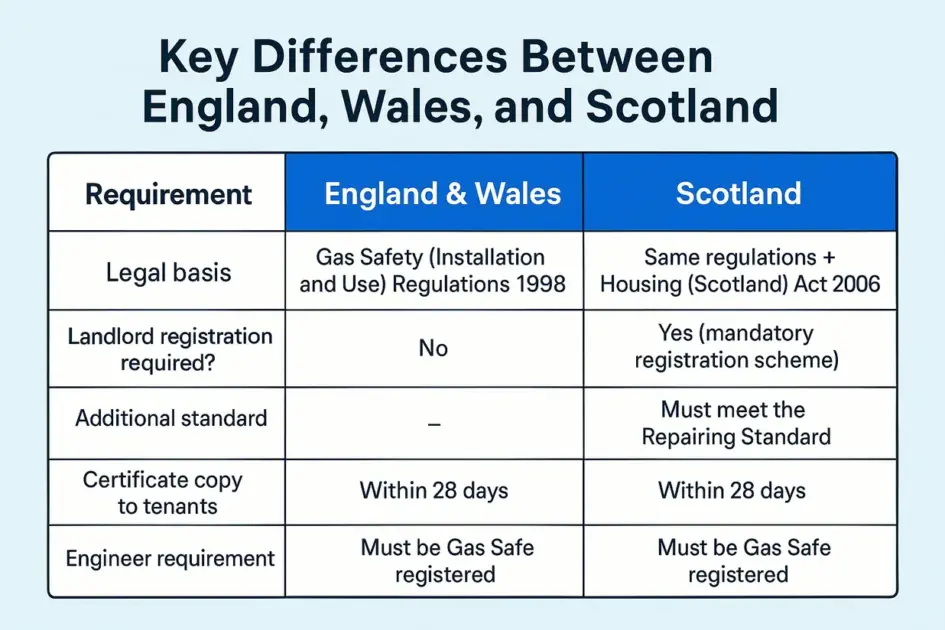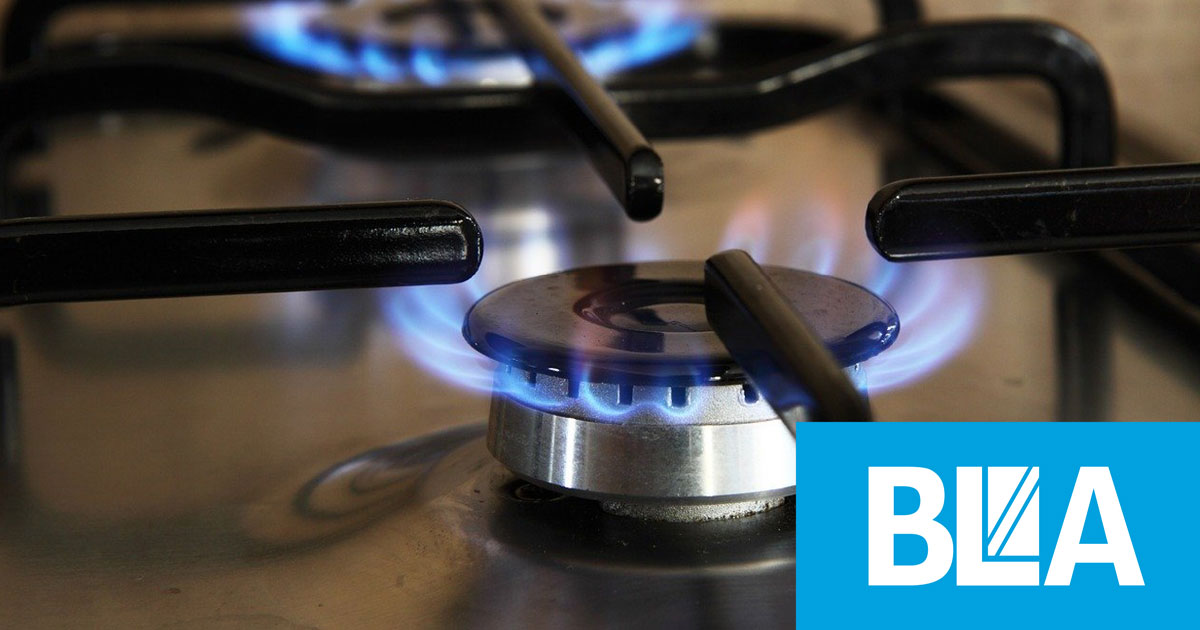Understanding Gas Safety Certificate for Landlords
Landlords across England, Wales, and Scotland are legally required to ensure that gas appliances and installations within their rental properties are safe.
A valid Gas Safety Certificate—also referred to as a CP12 Certificate—is a key part of meeting these obligations.
This article outlines the specific legal requirements in each UK region, helping landlords stay compliant and safeguard their tenants.
What is a Gas Safety Certificate?
A Gas Safety Certificate is an official document issued by a gas-safe registered engineer after carrying out a gas safety inspection.
The certificate confirms that all gas appliances, fittings, chimneys and flues in a rental property are safe and in proper working condition.
Legal Requirements in England and Wales
Under the Gas Safety (Installation and Use) Regulations 1998, landlords in England and Wales must:
- Ensure gas appliances, fittings, and flues are maintained in a safe condition.
- Arrange an annual gas safety check on every gas appliance and flue.
- Only Gas Safe registered engineers are used to carry out these checks.
- Provide tenants with a copy of the Gas Safety Certificate within:
- 28 days of the check being completed, or
- Before a new tenant moves in.
Penalties for Non-Compliance
Failure to obtain a valid gas safety certificate can result in:
- Fines up to £6,000 per breach
- Criminal prosecution
- Invalidation of landlord insurance
- Difficulty serving eviction notices under Section 21 of the Housing Act 1988
Gas Safety Obligations in Scotland
In Scotland, landlords are governed by similar legislation, including the Gas Safety (Installation and Use) Regulations 1998, reinforced by the Repairing Standard set by the Housing (Scotland) Act 2006.
Scottish landlords must:
- Conduct an annual gas safety check.
- Use only Gas Safe registered engineers.
- Provide tenants with a copy of the certificate within 28 days.
- Submit gas safety documentation as part of registration with the local authority under the Landlord Registration Scheme.
Additionally, landlords in Scotland are responsible for ensuring their property meets the Repairing Standard, which includes maintaining all gas installations in a safe and working condition.
What the Gas Safety Check Covers
A qualified Gas-safe engineer will inspect:
- Gas boilers and central heating systems
- Gas cookers, hobs, and fires
- Flues and ventilation
- Gas meters and pipework
- Appliance operation and safety devices
The inspection ensures all equipment is functioning safely and efficiently, with any potential issues reported.
Record Keeping and Tenant Communication
Landlords must:
- Keep copies of gas safety certificates for at least two years.
- Give tenants a current certificate at the start of each new tenancy.
- If appliances are unsafe, take immediate remedial action and stop their use.

Conclusion: Stay Compliant and Protect Tenants
Whether you’re a landlord in England, Wales, or Scotland, maintaining up-to-date gas safety certificates is not only a legal requirement but also a critical part of ensuring tenant safety.
By using registered engineers, scheduling annual inspections, and keeping clear records, landlords can remain compliant and avoid costly penalties.
Gas Safety Certificate for Landlords – FAQ
What is a Gas Safety Certificate (CP12)?
A gas safety certificate (also known as CP12) is an official document issued by a gas safety registered engineer after a gas safety inspection. It confirms that all gas appliances, pipework, and flues are safe and meet legal standards.
Who needs a Gas Safety Certificate?
All landlords in England, Wales, and Scotland who rent out residential properties with gas appliances must obtain an annual gas safety certificate.
How often must a gas safety check be done?
A gas safety check must be carried out once every 12 months by a Gas Safe registered engineer.
How do I get a Gas Safety Certificate?
You must hire a Gas Safe registered engineer to inspect the gas installations in your property. Once the inspection is complete and passes all safety checks, the engineer will issue the CP12 certificate.
How much does a Gas Safety Certificate cost?
The cost can vary depending on the number of appliances and the engineer’s pricing but generally ranges from £60 to £120 for a standard property with one or two gas appliances.
What happens if I don’t have a Gas Safety Certificate?
Failing to provide a valid certificate can result in:
- Fines up to £6,000
- Criminal charges
- Invalid landlord insurance
- Inability to serve a Section 21 eviction notice (in England & Wales)
Do I need a certificate if the property is vacant?
If the property has gas appliances and is intended for rental, you should still ensure gas safety checks are up to date—even during void periods—to remain legally compliant.
Can I do the check myself if I’m experienced with gas systems?
No. Only a Gas Safe registered engineer can legally perform gas safety checks and issue the certificate.
What should I do if an appliance fails the check?
You must stop using the appliance immediately and have it repaired or replaced before it can be used again. The engineer will note the failure on the report.
Do tenants get a copy of the certificate?
Yes. A copy must be provided to:
- Existing tenants within 28 days of the check
- New tenants before they move in.
Useful Links for Gas Safety Certificate Requirements
🏠 General and UK-Wide
Health and Safety Executive (HSE) – Gas Safety Guidance for Landlords
🏢 England and Wales
- Ministry of Housing, Communities & Local Government – Renting Guidance:
The British Landlords Association is a national landlord association for UK landlords and one of the largest landlord associations in the UK. The BLA is the only commercial landlords association in the UK. Join us now for £79.95!
Read our Blogs:
Disclaimer:
This post is for general use only and is not intended to offer legal, tax, or investment advice; it may be out of date, incorrect, or maybe a guest post. You are required to seek legal advice from a solicitor before acting on anything written hereinabove.





